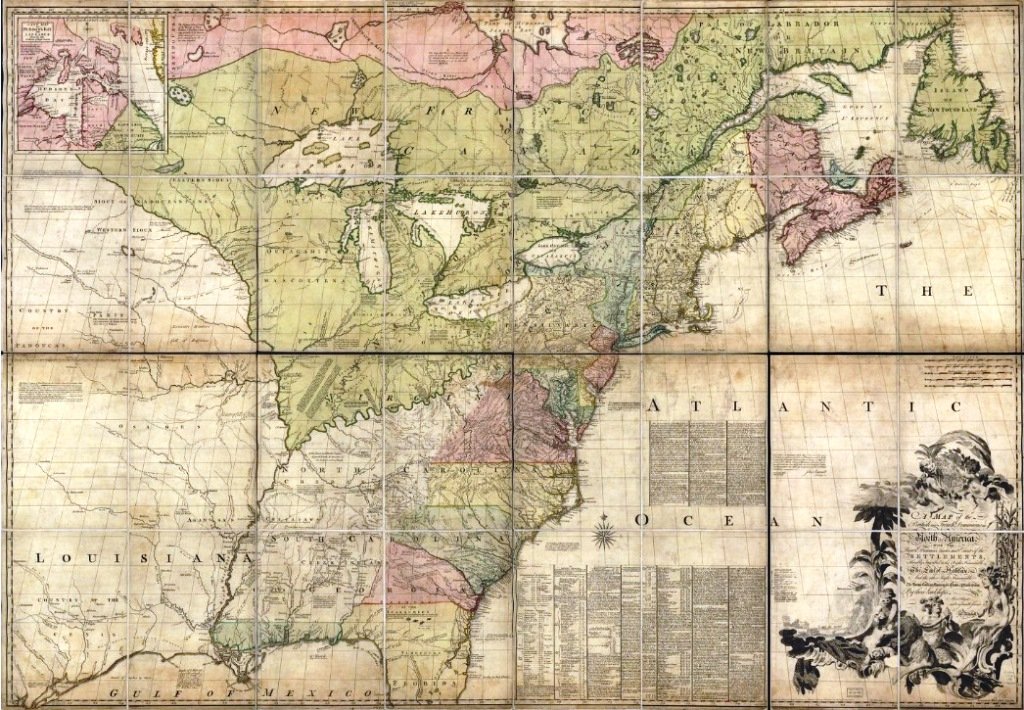Background on English America
In the long history of mankind, the history of the United States is relatively short and it has been tumultuous. The English colonized the Americas because their enemies, the Spanish and the French, were expanding in the Americas, and they felt they had to keep their enemies from taking control of the whole new world. But England had spent a lot of money on recent wars, so its treasury was pretty low and it did not have much money to invest in the new world. Also, the people of England had been impoverished and beaten down by the religious wars, and many just wanted to get out of England, so emigrating to the Americas was appealing to them.
The first permanent English settlement was Jamestown, named after King James I, and was chartered by the “Virginia Company of London” in 1606. Jamestown survived much better than did the original first Virginia settlement (the Lost Colony of Roanoke), and by the mid-18th century, there were thirteen British colonies, the last of which was Georgia.
COLONY YEAR FOUNDED BY
Virginia 1606 Virginia Company of London
Massachusetts 1620 Puritans
New Hampshire 1623 John Wheelwright
Maryland 1634 Lord Baltimore
Connecticut c. 1635 Thomas Hooker
Rhode Island 1636 Roger Williams
Delaware 1638 Peter Minuit and New Sweden Company
North Carolina 1653 Virginians
South Carolina 1663 Eight Nobles with a Royal Charter from Charles II
New Jersey 1664 Lord Berkeley and Sir George Carteret
New York 1664 Duke of York
Pennsylvania 1682 William Penn
Georgia 1732 James Edward Oglethorpe
By the late 18th century, English colonies in the Americas included: 1) Newfoundland, 2) Nova Scotia, 3) The thirteen American colonies, 4) Bermuda, 5) Bahamas, 6) British Honduras (was Spanish c1750: became British in 1798), 7) Jamaica, 8) British Leeward Islands and Barbados.
The American colonies thrived under a condition of ‘salutary neglect’ from England, until the King and Parliament noticed that the colonies were thriving, and that’s when the conflicts of interest started happening.
In 1772 Benjamin Franklin, after examining the wretched hovels in Scotland surrounding the opulent mansions of the land owners, observed that in ‘New England’ “every man is a property owner, has a vote in public affairs, lives in a tidy, warm house, has plenty of good food and fuel, with whole clothes from head to foot, the manufacture perhaps of his own family.”
The ‘enlightened’ American colonists felt they deserved all the rights and freedoms of Englishmen. The English, on the other hand, felt that the colonies were created to be used in the way that best suited the crown and parliament. This divergence of views and conflict is embodied in one of the rallying cries of the American Revolution: ‘No Taxation Without Representation.’
And, as we know, on Patriot’s Day, April 19, 1775, the English and the Americans started an armed conflict between each other in Lexington and in Concord, Massachusetts that would result in the American colonies winning their independence from England.
The war between these new united States of America and Great Britain was fought from 1775 until 1783, when final terms of peace between the two countries was declared in Paris. The ‘Paris Treaty’ was signed on September 3, 1783, and was ratified by Congress on January 14, 1784, formally ending the American Revolutionary War between the Kingdom of Great Britain and the united States of America.
Article 1 of the Paris Treaty individually lists all of the former colonies as ‘free sovereign and independent states.’ The sovereignty of the individual states was thus clearly understood and proclaimed by both parties signing the treaty:
“His Brittanic Majesty acknowledges the said United States, viz., New Hampshire, Massachusetts Bay, Rhode Island and Providence Plantations, Connecticut, New York, New Jersey, Pennsylvania, Delaware, Maryland, Virginia, North Carolina, South Carolina and Georgia, to be free sovereign and independent states, that he treats with them as such, and for himself, his heirs, and successors, relinquishes all claims to the government, propriety, and territorial rights of the same and every part thereof.” [Emphasis added]
Well, sovereignty was proclaimed, but the question of whether or not the British and the Rothschild banksters ever stopped interfering with America is being continually asked, and it appears to the most casual observer that the foreigners never did let go of their controlling interests in America.
I raise these points because the United States, from the very beginning, has gone through a lot of unnecessary misery and hardships, many times due to foreign interference in our country. Even the problems we see today are caused largely because of interferences from the international banksters, dual or foreign nationals inside our government (exclusively Israeli), and the lawlessness of the people who work for us in Washington.

Thank you for your sharing. I am worried that I lack creative ideas. It is your article that makes me full of hope. Thank you. But, I have a question, can you help me?